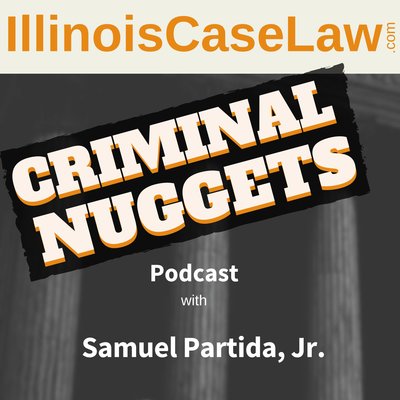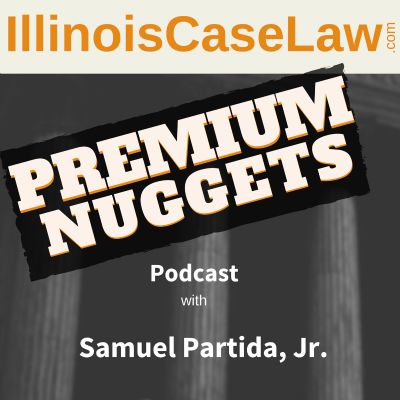Mar 28, 2019
People v. Encalado, 2017 IL App (1st) 142548 (February). Episode 314 (Duration 10:18)
Trial judge did not allow the defendant to ask the jury if they could remain impartial not withstanding the fact that likes to pay for sex.
Facts
Defendant was found guilty of a brutal sex assault.
The victim testified she got her into his car on a rouse and then punched her in the face and put her clothes over her face and raped her.
Other Crimes (not an issue)
Other crimes evidence was admitted.
The victim in the older case said essentially the same thing.
The defendant offered her a ride. When she got in the care he punched her in the face and put her clothes over her face then raped her.
She also had some items stolen.
Defendant's Story
Defendant’s defense in both situations was that they were prostitutes who got mad at him after he took back his money.
He asked the court to question the venire as to whether they could evaluate the evidence of assault without bias if they knew he had narcotics with him at the time of the alleged offenses. He testified he offered to pay the women with money and drugs.
Wanted This Question
He also asked the court to say to the venire, “you will hear evidence about prostitution. Would that fact alone prevent you from being fair to either side?”
"Hell No" Said Judge
The court refused to ask the venire any questions relating to drugs or prostitution.
Judicial Discretion
Our supreme court, in People v. Strain, 194 Ill. 2d 467 (2000), articulated the guiding principles for appellate review of questions asked on voir dire:
The trial court is given the primary responsibility of conducting the voir dire examination, and the extent and scope of the examination rests within its discretion.
However, the trial court must exercise its discretion in a manner consistent with the purpose of voir dire, which is to ascertain sufficient information about prospective jurors’ beliefs and opinions so as to allow removal of those members whose minds are so closed by bias and prejudice that they cannot apply the law as instructed in accordance with their oath.
Unbiased Jurors
The jurors must harbor no bias or prejudice which would prevent them from returning a verdict according to the law and evidence.
Thus, a failure to permit pertinent inquiries to enable a party to ascertain whether the minds of the jurors are free from bias or prejudice which would constitute a basis of challenge for cause, or which would enable him to exercise his right of peremptory challenge intelligently, may constitute reversible error.
Shield Not A Sword
However, the trial court should not permit the parties to use voir dire to indoctrinate the jurors or to ascertain prospective jurors’ opinions with respect to evidence to be presented at trial.
For example, Strain was a gang case.
He was worried about gang membership bias.
Defendant had no right to indoctrinate the jury or ascertain their attitudes towards his defense, so he could not ask whether the venire members could weigh impartially evidence that he robbed prostitutes.
Different Quetion
However, Encalado did not request that question. Instead, he asked the court to say to the venire,
“you will hear evidence about prostitution. Would that fact alone prevent you from being fair to either side?”
Sex Issues Are Goofy
The court noted that some sexual behaviors can evoke from many venire members strong responses that prevent the venire members from assessing evidence without bias.
Courts have noted potential juror bias against persons who exchange sex for money, homosexuals, people who perform in pornography, or pose nude for photos, and persons engaged in sexually immoral conduct.
The court said that jurors may hold similar biases against customers of women who exchange sex for money.
Analysis
The court held that defendant requested an appropriate question during voir dire to help him determine whether the potential jurors could weigh the evidence against him, without a predisposition to find him guilty of criminal sexual assault because he patronized prostitutes.
The trial court’s voir dire questions failed to reveal whether any members of the venire harbored a bias against persons who participate in prostitution, and therefore Encalado could not ascertain whether the minds of the jurors are free from bias or prejudice which would constitute a basis of challenge for cause, or which would enable him to exercise his right of peremptory challenge intelligently.
Holding
The judge chose the course that gave the parties no opportunity to discover whether any members of the venire could weigh the evidence impartially once Encalado testified.
The judge’s choice led to a high likelihood that some persons serving on the jury would react with strong disgust and antipathy toward Encalado when he testified that he patronized prostitutes.
Sure, voir dire is not perfect.
Sometimes biased people make it on a jury.
Nonetheless, questioning on voir dire provides a means for the parties to attempt to discover biases that could affect the parties’ right to a fair trial. The procedure used by the trial court here, and defended by the dissent, removed the possibility of discovering whether a venire member held a widespread bias that would affect his or her ability to weigh the evidence impartially.
Reversed and remanded.
Dissent
See the dissent that this case completely undercuts the purpose and the rationale behind the rape shield law.
The dissent said this was nothing but a transparent ploy, and it was properly rejected by the trial court.



